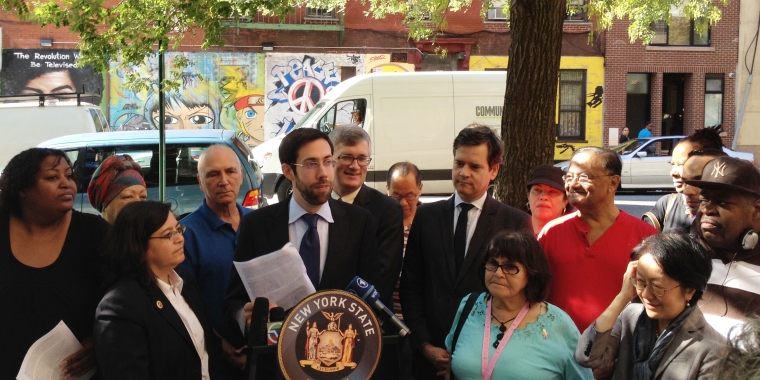State Lawmakers Seek To Help Struggling Retail Businesses
Feature article in The Lo-Down
A panel chaired by Daniel Squadron, our state senator, heard testimony from business owners and other witnesses Friday about the ailing retail industry in New York. Saying there clearly is a problem, Squadron pointed to the increasing number of shuttered shops, spiraling commercial rents and the proliferation of large chain stores. He said the ultimate goal is to identify how the state can help - and to draft legislation to deal with the most critical problems.
Among the witnesses was David Zarin of Zarin's Fabrics, the large discount design store on Grand Street -- a fixture on the Lower East Side for 70 years. He told the panel the costs of running his business are high and that he is being "nickeled and dimed to death" by a bewildering patchwork of local and state fees. Zarin said it's unfair that big corporations get generous tax incentives and another accommodations to open in the city - while small businesses are penalized and fined. He suggested the state find a way to redirect more tax breaks to local, family-owned businesses.
Susan Stetzer, representing Community Board 3, testified about the lack of retail diversity on the Lower East Side. She lamented the displacement of longtime businesses by bars, clubs and high end restaurants. Stetzer said business owners have repeatedly complained about rents that have doubled or tripled in recent years. While some business owners have suggested that landlords are greedily pushing rents higher - another explanation was offered up at Friday's hearing.
Witnesses testified that skyrocketing real estate taxes have forced many landlords to pass on at least some of their increased costs to retail tenants. One of the panel members, Assemblyman Gary Pretlow, suggested residential and commercial real estate taxes in New York City are out of whack - homeowners pay relatively low taxes, he said, while the owners of commercial buildings are getting socked with huge tax bills. Pretlow also argued that big box stores have "little regard for the communities they're in," and "if you don't continue to kiss up to them" (by offering more tax breaks) they're all too willing to close and move somewhere else.
Ted Potrikus of the Retail Council of New York disagreed. He told the lawmakers big chain retailers give back to communities by providing a lot of jobs. Potrikus also addressed the concern that the retail diversity of neighborhoods is suffering. In Brooklyn Heights, for example, residents have expressed alarm about the transformation of Montague Street, where "mom & pop shops" have been replaced by numerous national banks and phone stores. He said, "nostalgia alone won't keep a store open... unless you open your wallet, they won't stay."
That issue, of course, is a major concern on the Lower East Side. This summer, Orchard Street standbys like Guss' Pickles and Bonnie's New York (a hat and jewelry store), succumbed to the pressure of increasing rents. But those stores - and other establishments that are central to the historical character of the neighborhood, have also lost many of their most loyal customers. Some local businesses - like Russ & Daughters - have thrived in spite of the changing nature of the LES- but they are the exception. While not every store can be saved, there does appear to be a growing sense in Albany that the playing field should be leveled. In this way, the thinking goes, at least small businesses would have a fighting chance against the big corporate stores.
At one point in the hearing, Assemblyman Brian Kavanagh seemed to be weighing whether zoning laws should take into account "a community's desire to have services" (like dry cleaners and hardware stores). In San Francisco for example, there's an ordinance that restricts "formula retail stores," defined as companies with at least 12 stores nationally and having at least two standardized traits, such as trademarks, merchandise, facades, signs or colors.
Squadron said the members of the panel will decide how to move forward with proposed legislation. It's possible they'll try to work together with New York City officials, since so many issues raised Friday are not within the state's purview. But Squadron said it's clear to him the state should be part of the solution.
